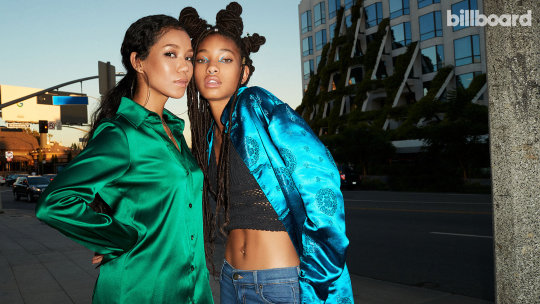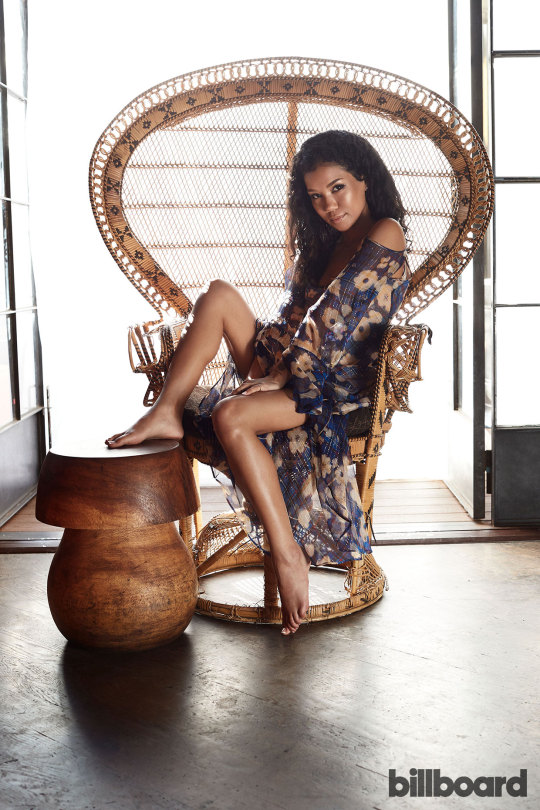#we’re in the same wavelength and frequency when it comes to graves and I love that
Text
Tourmates Jhené Aiko & Willow Smith Discuss Mushrooms, Magic & Industry Misogyny With Billboard

On a hot late-October evening at a rustic-chic Sunset Strip restaurant, Jhené Aiko lifts and considers a truffle fry before nimbly popping it into her mouth. Next to her, Willow Smith grabs four and crams them all in at once, so engaged in a discussion with Aiko about fantastical art that she exclaims, mid-bite, “Magic is all around us!” Aiko nods: “I learned that on mushrooms.” Smith fervently nods back: “Mother Nature did it for a reason: ‘Here’s something to woke ya!’”
Starting Nov. 14, Smith will support Aiko on her North American Trip Tour, named after Aiko’s latest album (and its accompanying short film), a sprawling psychedelic R&B concept piece about overcoming grief that reached No. 1 on the Top R&B Albumschart. Willow’s surprise second LP, The 1st -- released on Halloween, which is also her birthday -- swirls proggy compositions with left-field folk and soul.
Together, Aiko and Smith seem to embody a new breed of modern hippie: Aiko, 29, a self-proclaimed “NPR girl” in a loose sky-blue frock, steeping her chamomile tea bag with guru-like calm, and Smith, 17, vibrating with energy, in bell-bottom jeans and a black tee that reads in white text, “Got consent?”
But despite their age gap -- and the fact that one woman has been a single mother for nine years and the other is, well, the teenage daughter of Will and Jada Pinkett Smith -- Aiko and Smith have much more in common than an interest in the supernatural. Both were born, raised and home-schooled in Los Angeles. Both were signed as children and marketed to the mainstream -- Aiko as an adjunct member of R&B boy band B2K, and Smith as an actress (2007’s I Am Legend), then as a kiddie-pop star with 2010’s “Whip My Hair,” which peaked at No. 11 on the Billboard Hot 100.
Then, with money and fame hanging in the balance, they each walked away. Aiko took about six years off before starting an alt-R&B solo career flexible enough to allow for esoteric side projects like Twenty88 -- her duo with boyfriend Big Sean, whose self-titled album Aiko has described as “combining stuff like robots and sex” -- and a forthcoming poetry book titled Trip. Willow returned in 2015 with avant-garde soul album ARDIPITHECUS, and often posts genre-flouting collaborations on SoundCloud and a now-defunct YouTube channel (“Frequencies by Willow”) with everyone from The Internet’s Syd to her brother Jaden.
As plates of pasta arrive, Aiko and Smith dive into a wide-ranging conversation, often completing each other’s sentences as they discuss their respective decisions to, as Smith puts it, “take control of not just my music, but my life -- if shit goes south, it’s my fault, but if it goes good, that’s mine too,” and affirming their vows as artists to, in Aiko’s words, “usher in new ways of thinking.”
You last toured together in 2014. Willow, you were 14. What was that like for you?
Willow Smith: Coming out of the “Whip My Hair” days, that was the first time I’d ever toured with artists I listen to [in addition to Aiko, Syd and SZA]. I’d started playing guitar, and that tour really solidified: “OK, I want to be a live musician, to have a music career, for real.” Being around people who were so confident and so set in their artistry was a huge step in the direction of understanding who I really am.
Jhené Aiko: We did that for each other. I’d never considered myself a performer, but now I’m super into how I present these songs. This time, I want to take the audience on a journey, have them feel what I went through -- I want them to think they’re tripping balls. People like Willow and me, we’re super connected to this music and our message. We really want to change the world.
Jhené, what made her right for that tour three years ago?
Aiko: It’s crazy because just following her career and social media, I felt connected to her, especially seeing her talk about being an indigo and a star seed. I saw so much of myself in her.
Smith: Yeah. I’ve followed your music from the beginning and always loved how angelic and sultry your voice is. So when I heard that you wanted me on, I was like, “Whoaaa!”
Wait, let’s rewind a second. What’s this “indigo” thing?
Aiko: So if you look up in the night sky and see this light that’s flashing colors, that’s Sirius. It’s a star system, and it looks like there’s a party going on. What I like to believe in my dreams and imagination is, there’s some of us on Earth that come from there, indigos and star seeds, who are hyper sensitive to feelings and seasons, and in tune with each other without even trying --
Smith: Or even knowing. I’ve read and experienced that many indigos struggle with addiction and heartbreaking circumstances because this reality is not familiar to them. The density of the third dimension is so heavy on their soul, and they yearn to be light, to be in the stars. So you can --
Aiko: Free yourself from the physical and just be pure energy. I started singing when I was really young too, and touring when I was 12, so those were things I would think about and wanted to talk about, but I was home-schooled, so I didn't have many friends on the same level.

Willow, you were home-schooled too, right?
Smith: All my life, except from age 12 to 13 when a family friend was like, “Come to school with me. I’ll help you out.” But I live in the mountains, away from the city, far from people. It was literally me and Jaden in nature hitting cactuses with sticks, so school was really overwhelming. I was that girl: backpack half open, running through the halls, stressed. So I got to see firsthand how it shapes your psyche -- like how you’re always looking for approval. That’s the hugest thing.
Aiko: I started home school in the middle of seventh grade. I loved schoolwork, but the social part was too much for me. I’m a hermit, still. My family goes out, and I’m like, “I’ll be home staring at the wall ’cause I like it.” The past couple years working on Trip, I’d go on road trips or to festivals by myself, meet other wanderers. That’s why we’re doing this tour -- we’re on that wavelength.
I get the sense that there’s something deeper than a big sis, little sis thing going on here...
Aiko: Willow’s a being that has been here before, obviously. I don’t get age. I mean, I have a 9-year-old daughter who has this pure knowledge, and I learn so much from her. I feel like this is my 20th life because from the first moment I can remember, I’ve been over the kid things.
Smith: Yeah, I understand. I don’t know what it is. I felt that way too.
Have you given any thought to how you might spend downtime together on this tour?
Aiko: I want to make music. I’ll have a studio on my bus, and she can come through with her guitar. I’ve also been doing a group meditation the day of a show. I’m reading The Seven Spiritual Laws of Success by Deepak Chopra, and he talks about setting your intention. Mine is to calm people, but I get really nervous onstage.
Smith: What I think is really going to happen on this tour is, like, a feminine energy super bomb. This tour is going to be so potently feminine it’s going to warm your heart.
You’re both into poetry and philosophy. What about a book exchange?
Aiko: A book club!
Smith: I have always wanted to be in a book club. My entry would be The Red Tent by Anita Diamant. It’s about these sisters who lived a long time ago and this tradition of when the women menstruated, they’d all go into the red tent together. They’d have these crazy conversations and spiritual ceremonies and shamanic experiences. It’s about female camaraderie in terrible times.
Aiko: Mine is Peace Is Every Step by Thich Nhat Hanh. He’s a poet and monk from Vietnam. He tells beautiful stories to get across very simple messages. Like how people get agitated in traffic -- he teaches you to take each red light as a chance to breathe deeply.

I can see you two sharing music, too. Who’s an artist more people should know about?
Aiko: Michael Franks, a jazz artist from the ’70s. His voice is like butter, and his writing? So clever. I love jazz because of the range of emotion it can take you through in one track. I’m a fan of John Mayer for the same reason. For Trip, he came in with, like, 50 guitars, and for hours he was coming up with song ideas and melodies one after the other, nonstop.
Smith: Cameron Graves. He plays with Kamasi Washington, and his Planetary Princealbum is the epitome of each musician showing their uniqueness. Not a lot of my peers are open to music that doesn't have vocals.
Aiko: That’s my favorite. I think we should do a jazz album.
Smith: Let’s! Honestly, we can get a bunch of musicians in a room and just vibe out.
You were both signed young and could have followed very traditional career paths, but you took time off and came back to the business on your own terms. What was the moment you decided: “This is my own trip?”
Smith: When I said no to Annie [in 2013]. The script was written, we had paid people, the production was going to happen. A lot of people were putting pressure on me, and I was like, “I have to take the control.” That was scary, standing up to executives who were like, “What? We spent this amount of money. Mmm, you’re doing it.” And I was like, “No, I’m not going to. Sorry.”
Aiko: I was turning 16, and my label contract was up. Everyone assumed I was going to re-sign, but I knew that wasn't who I was going to be as an artist -- I wasn't satisfied singing songs other people wrote. Then when I was 20, I got pregnant. I became a waitress at a vegan cafe but was going through all these new things as a mom and wanted to make music about it. So I quit, and from then on, it was like, “No, this is my vision. You have absolutely nothing to do with this art.”
As young women of color in an industry that is hard on women and on people of color, where do you think that surge of confidence came from?
Smith: You have to see other black women doing them. That’s the only way. I went on tour with my mom when I was Jhené’s daughter’s age, and it was so empowering and beautiful.
Aiko: I never saw a distinction between a man and a woman. My grandparents and my mother were great examples of men and women, and they taught me equality. So I would fight with boys and wear my cousin’s clothes. I would do whatever I wanted, and that’s where I still stand today.
Smith: If you truly believe in equality, you know it up here. [Taps forehead.] It’s how you think. There’s a lot of women doing their thing, expressing themselves in ways I feel weren't possible before. At the same time, a lot of men still spit misogyny like it’s nothing. It’s a forever journey.
Women have been banding together lately to expose predators in the entertainment industry…
Smith: Yeah, and our president. Ahhhhhh! The creepiest dude of all!
Aiko: I’m pleased people are brave enough to come forward, because it encourages others. I’ve always been protected. My mom was my manager. Now my older sister is. Even when I’ve been in sketchy environments, someone always had my back. That’s important. In these stories these women are telling, there’s no real friends around. I have definitely experienced male ego...
Smith: And I’ve ran into situations with white men specifically who are like, “Black girls don’t usually look like you,” or, “Whoa, your hair is lying down. That’s crazy, you actually look pretty!”
What do you want the future of young women in art to look like?
Smith: I don’t want there to always be this stigma of the “female” artist. “Oh, what does it feel like to be a female doing something?” That hurts me.
Aiko: Because of that, a lot of young girls compare themselves to others. Growing up, people wanted me to do choreography. If it wasn't for a supportive mother, I would have been put in the same boot camp. You were born into your own lane -- don’t let anyone push you into theirs. I’m not going to stop evolving until I’m 80. Like, I want to go back to school for astrophysics.
Smith: The arts and the sciences! That’s my whole life. In the future, I think there’ll be a new kind of person who does both. Like... an imagineer!
Aiko: See? I mean, clearly, she’s in her own lane.
© Billboard
Written By Chris Martins / Photography By Nate Hoffman
42 notes
·
View notes